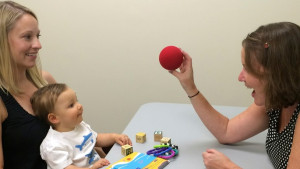
Child’s first communicative gesture
Child’s first communicative gesture
Child’s first communicative gesture, Pointing is a stepping stone towards communicating with the environment. It is a child’s first communicative gesture. Typically, the ability of pointing is achieved by the age of 18 months. If a child is not pointing by the right age or is pointing in a deviant manner, it can be of concern. Read more about Pointing in a previous article (here).
Questions such as, ‘whose assistance do we seek if the ability of pointing is not developed?’, ‘can one teach the skill of pointing?’ and ‘can I teach pointing to my child if s/he is not using gestures?’, maybe vexing a parent’s mind. Here are some answers to a few of these questions:
1. My child is not pointing, who should I see?
 If the child has passed the 18-month mark and is not showing any type of pointing, does not have many gestures, is not babbling and/or has no interest in watching another speaker point during communication, it is important to seek professional help.
If the child has passed the 18-month mark and is not showing any type of pointing, does not have many gestures, is not babbling and/or has no interest in watching another speaker point during communication, it is important to seek professional help.
It is best to connect with the child’s (developmental) pediatrician. Someone who has been following the child’s development will have a holistic understanding of the child. A pediatrician can understand and assess a possibility of a disorder if any.
A qualified and experienced therapist is important to visit also. Generally, the pediatrician will guide you towards them. The therapists include Speech Pathologists, Occupational Therapists, or Special Educators. These therapists will be able to assess the child’s skills when compared to typical development. They will be able to draw along several skills and get clarity about which skills are falling behind that may hinder pointing.
2. Can the skill be taught?
There is a good chance that a child with a developmental delay can be taught to point. However, it would require a thorough assessment of overall developmental skills of the child and an understanding of any underlying diagnosis (if any). This would be able to guide the training/therapy plan to be able to get the child to learn the ability.
3. Will my child’s whole-hand pointing refine to index-finger pointing?
Typically, a child may move from whole-hand pointing to index-finger pointing within a few months. For a child with developmental delays, it may not happen by itself, but must be taught.
4. My child is not using any gestures, not babbling. Do I focus on teaching pointing?
Few basic gestures precedent the skill of pointing in children. Pointing also, in neurotypical children, is a bridge between babbling and first words. When both these skills are lacking, it is necessary to view the reason for it.
Even if a child is not babbling, pointing should still be taught. This will ensure that the child has a means to communicate his / her needs despite not being able to vocalize or use words.
If the child has not learnt any gestures, it is essential to focus on few basic skills first. Skills such as – understanding of names of few common items, some eye-hand coordination, communication intent etc.- are needed before pointing is taught along with some basic gestures.
5. Should pointing be the first way to communicate with my non-verbal child?
A non-verbal child requires some means to communicate his / her needs. It is essential for a parent or therapist to assist a child to find a voice for him/herself. Pointing is a great tool to equip the child since it is an easy way to get needs fulfilled. It is a skill that can also be used effectively for higher end non-verbal communication tools. Therefore, if the child has basic pre-linguistic skills (such as basic attention, recognition of few items etc.), pointing must be taught as soon as possible.
Read the next article on pointing, to receive tips on how to encourage the skill!
***
Subscribe to us and get notified of our latest articles!
***
For more ideas check out our other blogs https://1specialplace.com/news/
- What is speech therapy and what Speech Therapist Do? - December 22, 2022
- 5 Simple Ideas to Make Flashcards Fun - June 28, 2018
- Should I use ‘NO’ with my child? - June 24, 2018


Leave a Comment
(0 Comments)